at Confederate Memorial State Historic Site
The First National Flag -- Stars and Bars
May 4, 1861 - May 1, 1863
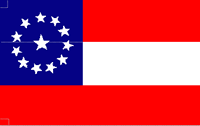 The Confederate States of America solicited designs for a national flag early in 1861. Hundreds of designs were submitted and on May 4, 1861, the First National Flag was adopted (there would eventually be two others). Nicknamed the “Stars & Bars,” it originally had seven stars for the first seven states to secede. It would eventually have 13 stars, representing all the states in the Confederacy.
The Confederate States of America solicited designs for a national flag early in 1861. Hundreds of designs were submitted and on May 4, 1861, the First National Flag was adopted (there would eventually be two others). Nicknamed the “Stars & Bars,” it originally had seven stars for the first seven states to secede. It would eventually have 13 stars, representing all the states in the Confederacy.
The Second National Flag -- Stainless Banner
May 1, 1863 - March 4, 1865
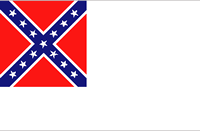 In the spring of 1862, the Confederacy solicited proposals for a new flag. Many felt the First National Flag was too similar to the United States flag. The Confederate Congress adopted the Second National Flag on May 1, 1863. The flag combined a canton of a blue saltire emblazoned with stars (a popular design proposed for the national flag and used in battle by many regiments) and a pure white field to symbolize the purity of the cause the Confederacy felt it represented.
In the spring of 1862, the Confederacy solicited proposals for a new flag. Many felt the First National Flag was too similar to the United States flag. The Confederate Congress adopted the Second National Flag on May 1, 1863. The flag combined a canton of a blue saltire emblazoned with stars (a popular design proposed for the national flag and used in battle by many regiments) and a pure white field to symbolize the purity of the cause the Confederacy felt it represented.
The Third National Flag -- Revised Stainless Banner
Adopted March 4, 1865
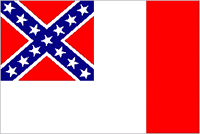 By late 1864, complaints of the Second National Flag looking too much like a flag of truce drove the Confederacy to consider a revision. On March 4, 1865, a red stripe was added to the outer half of the field. This was the third and last national flag of the Confederate States of America.
By late 1864, complaints of the Second National Flag looking too much like a flag of truce drove the Confederacy to consider a revision. On March 4, 1865, a red stripe was added to the outer half of the field. This was the third and last national flag of the Confederate States of America.
Battle Flag
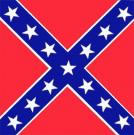 Military units commonly carried distinct flags for identification on the battlefield. They were used as signals, markers and inspiration for troops. Confederate regiments used a variety of battle flags. The Army of Northern Virginia and several other regiments chose the blue saltire on a red field emblazoned with white stars. It was also adopted as a symbol of the Confederacy by veteran groups in post-wartime.
Military units commonly carried distinct flags for identification on the battlefield. They were used as signals, markers and inspiration for troops. Confederate regiments used a variety of battle flags. The Army of Northern Virginia and several other regiments chose the blue saltire on a red field emblazoned with white stars. It was also adopted as a symbol of the Confederacy by veteran groups in post-wartime.
Missouri State Guard Flag
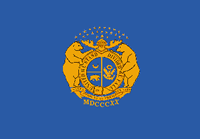 After seceding from the Union, many Confederate states adopted state flags. Missouri did not enact legislation to adopt an official Confederate state flag, but a state guard flag was adopted in Missouri by direction of Gen. Sterling Price in the spring of 1861.
After seceding from the Union, many Confederate states adopted state flags. Missouri did not enact legislation to adopt an official Confederate state flag, but a state guard flag was adopted in Missouri by direction of Gen. Sterling Price in the spring of 1861.
Missouri Battle Flag
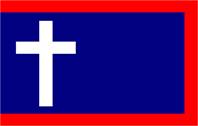 Sometimes called “Price’s flag,” this flag combines a blue field bordered in red with a white Roman cross. It was carried by several regiments in Missouri and has therefore been termed the “Missouri Battle Flag” in recent years.
Sometimes called “Price’s flag,” this flag combines a blue field bordered in red with a white Roman cross. It was carried by several regiments in Missouri and has therefore been termed the “Missouri Battle Flag” in recent years.
Additional Information on Confederate flags can be found in the following books:
Cannon, Devereaux D. The Flags of the Confederacy: An Illustrated History, Memphis: St. Lukes Press, 1988
Coski, John M. The Confederate Battle Flag: America’s Most Embattled Emblem, Cambridge: Harvard University Press, 2005






